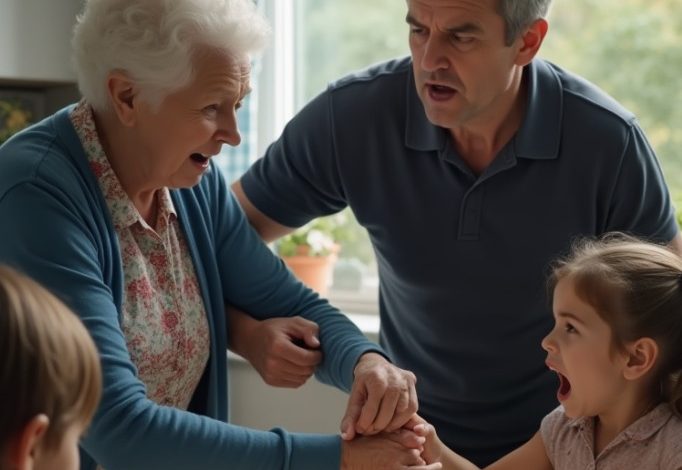My Son Slipped Me a Note at Breakfast – Minutes Later, a Call From an Unknown Number Shocked Us All

At breakfast that Sunday morning, my son slid a small folded note beneath my plate. It said: “Leave your phone here. Don’t look back.”
For a moment, my fork hovered above my toast. My whole body froze. I blinked at him, confused, but his eyes gave me no explanation.
Minutes later, the phone sitting on the table — my phone — lit up and began to ring. It wasn’t one of my saved contacts. It was an unknown number. The sound felt louder than it should have been in my quiet kitchen. Both my son and my granddaughter looked at me. Everyone stared.
My name is Margaret Collins, though the people closest to me have always called me Maggie. I’m seventy-two years old, a retired school librarian, a widow, and a woman who has lived a very quiet, ordered life. My house sits on a calm street lined with old trees where the loudest noise is usually the call of birds in the morning or the low hum of a passing car. My days are measured in small comforts: the first sip of tea from my favorite porcelain cup, the soft scratch of a crossword pencil, and the golden square of sunlight that creeps across my kitchen window every morning.
Since my husband, George, died, these small rituals have been my safe place. A home can be a kind of shield. It becomes the walls you lean on. And for me, Sundays had always been the days when that shield felt strongest, because my family filled the space with life.
On Sundays, my son Daniel comes for breakfast. He’s forty, hardworking, the sort of man who carries other people’s worries in the set of his shoulders. His daughter Lena, my granddaughter, is twenty-five. She’s bright and determined, full of plans, the kind of young woman who glows when she speaks. She says my house feels like home and that my stories over tea beat anything she can get in a coffee shop.
That Sunday morning, the kitchen smelled of buttery toast. Sunlight spilled across the floral wallpaper. Lena was in the middle of a story about a clumsy coworker, laughing so hard she had to wipe tears from her eyes. Daniel, however, was a storm cloud in a bright room. He stared down at his scrambled eggs, pushing them around his plate without eating.
“Daniel,” I teased softly, trying to lighten him, “if you keep staring at that plate, your eyes will get stuck there.”
He gave me a quick smile that didn’t reach his eyes. My stomach tightened. Something was off. I could feel it in the air like a low, invisible vibration under the cheerful chatter. Still, a warm wave of gratitude ran through me. Family breakfast might seem like a small thing, but to a woman who has lost so much, these mornings are the framework of life. I thought it was just another gentle Sunday.
I was wrong.
When I reached for the marmalade, Daniel leaned forward slightly. With a movement so quick and subtle I almost missed it, he slipped a folded piece of notepaper under the edge of my plate. His fingers brushed mine. They were ice-cold. Beneath the table, I opened it. The writing was his — neat, sharp, urgent.
Leave your phone here. Don’t look back.
A shiver crept down my spine. I looked up, my mouth opening to ask what he meant, but his eyes pinned me. His jaw was tight, his gaze pleading. He gave the faintest shake of his head. This wasn’t a joke. This was fear.
Before I could even think, a sound sliced through the morning calm. Not my normal ringtone. Not a soft notification chime. This was a shrill, piercing tone, like glass breaking, like an alarm. My phone, sitting innocently on the table, lit up. The screen displayed two words: Unknown Number.
Lena froze mid-gesture, her teacup hovering in the air. Her eyes flicked from the phone to me.
“Don’t touch it, Mom,” Daniel said quietly but firmly.
The sound kept going, sharp and relentless, filling the kitchen. My chest tightened. My hand moved toward the phone on its own, but Daniel’s hand shot out and grabbed my wrist.
“No,” he repeated, harder this time. “Leave it.”
The ringing stopped as abruptly as it began. But the silence that followed wasn’t relief. It was heavy. Watchful. From the speaker of the phone came a faint hiss of static. And then a voice emerged — a deep, distorted baritone, as if scraped from a broken recording. It sounded both too close and impossibly far away.
It spoke one word: “Margaret.”
My blood turned to ice. My own name had never sounded so vile. Lena gasped beside me and clutched my arm.
“Grandma, who is that?” she whispered.
I couldn’t answer. My throat was dry as sand. Every instinct told me this wasn’t a prank.
The voice returned, clearer now, edged with a cold amusement. “She belongs to us. You can’t keep her safe.”
Lena’s grip tightened until it hurt. I looked at her pale, frightened face and a horrible realization dawned. The voice wasn’t talking about me. It was talking about her.
Daniel muttered a curse under his breath, snatched the phone from the table, and pressed the power button. The screen went black, but the voice kept going, seeping out of the dark speaker like a phantom.
“She will not make it home.”
Lena let out a choked sob. “Why me?” she whispered. “What does this mean?”
I pulled her into my arms. “It’s nonsense,” I said, though my own voice shook. “It’s just a sick joke. You’re safe here.”
But I didn’t believe it. I’ve lived long enough to know what real malice feels like, and this was it. Daniel slammed the phone face-down on the table. The voice finally went silent. The only sound left was the ticking of the kitchen clock, each second a warning.
I turned to my son. “Daniel. What’s happening? What do you know?”
He ran a hand through his hair, frustration etched into his face. “Mom, your phone has been compromised. This isn’t a random prank. Whoever this is, they know your name. They know about Lena. This is targeted.”
“But I don’t know anyone who would do this!” Lena cried. “Why would someone come after me?”
Daniel’s jaw was a knot of tension. “It’s not about you, Lena. Not directly. It’s about Mom. They’re using you to get to her.”
His words sliced into me. My mind went racing through decades of memories — colleagues, students, strangers. Could I have made an enemy so patient, so cruel?
“I don’t feel safe,” Lena whispered. “I don’t want to go back to my apartment tonight.”
“You won’t,” I said, taking her hand. “You’ll stay here with me.”
Daniel nodded. “We have to treat this seriously. If they’re listening through your phone, if they’ve been watching, they already know too much.”
My cozy kitchen felt like a trap. The house I had always thought of as a fortress now felt exposed. Someone was out there, trying to break into our lives. Looking at Lena, I made a silent promise. Whoever they were, they had just picked the wrong family.
That night we drove Lena to her apartment to collect some things. The city streets felt different — darker, dangerous under the bruised sky. Daniel drove, his hands tight on the wheel, scanning every mirror. Lena sat in the back seat with me, her head on my shoulder, trembling.
When we reached her building, my heart sank. Her apartment door stood ajar. She always locked it. The windows were dark.
“Stay behind me,” Daniel said, pulling a heavy flashlight from the glove compartment.
We stepped inside. The living room was chaos. Couch cushions torn open, books thrown across the floor, kitchen drawers yanked out and dumped. But it was the wall above the sofa that made me stop. A family photo had hung there — the three of us at a picnic. The glass was smashed. Lena’s face had been cut out. The pieces lay on the floor like a wound.
Lena made a broken sound. “Why are they doing this?”
Daniel moved the flashlight beam across the room, jaw tight. “Stay close.”
Then from my purse came the faint hiss of static. My phone — still dead — began to crackle. The voice came again, low and distorted: “You shouldn’t have come.”
Lena clung to me. Daniel hurled the phone against the wall. It shattered, but the voice didn’t stop. It grew louder, echoing as if the walls were speaking.
“She will not leave this place. You cannot protect her.”
Something inside me snapped. I wasn’t just a grandmother anymore. “Who are you?” I shouted into the empty air. “What do you want from her?”
Silence. Then the voice came one more time, slow, dripping malice: “She will pay for what you owe.”
The words struck me like a blow. What I owed? My mind scrambled for answers.
Daniel’s flashlight swept the room. No one there. But the menace was real. “We’re leaving,” he said. “Now.”
We fled into the night. Sirens wailed somewhere far away. In the parking lot, under the harsh glow of a streetlight, I held my sobbing granddaughter and knew this was not the end. This was the beginning.
Back at my house, the kitchen clock ticked past midnight. Sleep was impossible. Daniel sat hunched over his laptop, trying to trace our phantom. Lena twisted a silver locket around her neck with shaking hands.
“Grandma,” she whispered. “What if this never stops?”
I covered her hands with mine. “Fear only wins if we let it,” I said, my own fear buried under a new steel edge. “They want to scare us. But they picked the wrong family.”
At dawn, pale light spilled through the curtains. I sat beside my sleeping granddaughter, stroking her hair. I was no longer just Maggie Collins, quiet widow. I was her protector.
And whoever had sent that voice had no idea what they had awakened.










